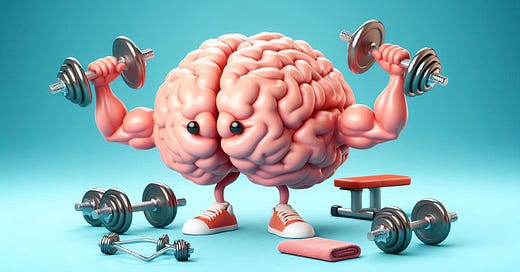Few supplements are as popular as creatine for bodybuilders and athletes, and its effectiveness in that regard is well proven. Less well known is the growing field of research indicating that creatine is a potential cognitive enhancer and mood regulator.
There’s nothing like killing two birds with one stone.
Please hit the ❤️ at the top or bottom of this email to help others discover Your Nutritionist Recommends. Your support means a lot!
Creatine is a compound that is found in every cell of the body, where it is essential for energy production. It is converted into phosphocreatine, a substance needed to make adenosine triphosphate (ATP). ATP is the unit of energy that is burned in the mitochondria of each cell.
Children and adolescents need creatine for growth. It makes them tall and lean. Without it, they have slower growth, less muscle mass and less bone density.
Where do you find creatine?
There are two ways you source creatine: you make it yourself and you get it from diet. You need, on average, 2-4 g daily.
About half of your requirements comes from diet. It is found exclusively in animal-source foods, mainly seafood and red meat. Herring is a top source, as is salmon, tuna, beef, pork, chicken and cod. Trace amounts are found in some dairy foods.
The other half you make in the body from the amino acids arginine, glycine and methionine.
Role in muscle
Athletes take creatine in supplement form because it provides immediate energy and improves physical performance and endurance. It also increases muscle mass and strength.
Muscle relies exclusive on dietary intake and the synthesis of creatine in the liver, kidneys and pancreas.
The brain, on the other hand, can make its own supply: the enzymes required to do so are found in the central nervous system.
Role in the brain
The fact that the brain makes its own creatine (in the same way that it makes its own cholesterol) suggests that choline is too crucial to be made off site. Exactly what role it plays in brain function is the subject of much recent research.
The human brain is a fuel-burning furnace. It may only occupy 2% of body mass, but it burns 20% of all available energy.
Creatine regulates that energy-producing activity and is critical to brain metabolism. Just as creatine provides instant energy to muscles, it provides rapid, immediate energy to the brain. Thanks to creatine, ATP is generated quickly and maintained during periods of high energy requirements. It ensures there are no breaks in the fuel supply. That is one reason why it is considered an important component of memory and neurotransmitter function.
Indeed, studies have ‘repeatedly’ shown that creatine improves memory, attention and executive function.
Furthermore, creatine is an antioxidant that scavenges and neutralises harmful free radicals in the mitochondria. It is thought that this could explain its supporting role in preventing neurodegenerative illnesses like Alzheimer’s and Parkinson’s.
Free radicals damage brain cells and impair their function, and you need all the antioxidants available to you to preserve your cognitive faculties, especially with age.
Supplemental creatine for the brain
As a supplement, it is usually taken as creatine monohydrate. It is considered a safe, well-studied supplement with no significant side effects. The dosage is usually around 5 g daily, equivalent to more than 1kg of meat consumption.
Obviously you’re unlikely to eat that much meat. Creatine is provided in a therapeutic dose: supplementation has the added benefit of raising creatine reserves in the central nervous system, and the result is increased ATP restoration.
Maintaining a reserve is highly advantageous. Studies suggest that high dose supplements, greater than those used for building muscle, are effective because the brain is ‘less prone’ to dietary creatine uptake.
Supplementation means you are not relying entirely on your central nervous system to produce sufficient creatine. There are certain situations when this back up could prove invaluable.
For example, in traumatic brain injury there is alteration of ATP demand because of reduced blood flow and oxygen. Brain creatine is also reduced following injury…’making creatine supplementation, and subsequent increase in brain creatine, a potentially valuable strategy to reduce severity of, or enhance recovery’.
A systematic review and meta-analysis, published in 2024, explored the effects of creatine monohydrate supplementation on cognitive function in adults. In total, 16 randomised controlled trials, involving 492 participants aged 20-76, were included in the review.
The conclusion of this review was that creatine supplementation had significant positive effects on memory, attention and processing speed.
‘Current evidence suggests that creatine monohydrate supplementation may confer beneficial effects on cognitive function in adults, particularly in the domains of memory, attention time, and information processing speed’
Creatine improves not just function, but also mood.
A study published in 2020 examined the association between dietary creatine and depression in US adults. Examination of data from 22,692 people from the 2005-2012 National Health and Nutrition Examination Survey revealed that the lower the dietary intake of creatine, the higher the prevalence of major depressive disorder. That was especially the case for women. The difference in depression prevalence between the highest and lowest dietary intake was 42%.
Muscles and brains are similar in that they both have high energy demands, and if that energy is not available you can feel both physically and mentally depleted. Those demands can be met by the same fuel provider, which is rather handy for anyone aiming for both brains and brawn.






I take a scoop of creatine in the morning so I am glad to hear it is good for my brain as well as my muscles
Thanks Maria. Your posts are very informative.